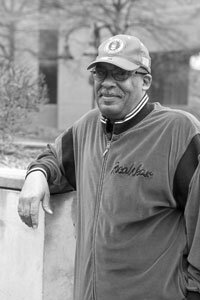NEWS- The beat: Retiring veteran cop tells all
Marvin Townsend has trouble sleeping these days. But after 25 years and five months on the graveyard shift at the Charlottesville Police Department, that's probably to be expected.
Townsend retired December 1, ending a career that began when the police department might have been considered a good ole boys network.
"One of the biggest problems I had was the discrepancy in pay between black officers and white officers," he says.
In 1998, Townsend joined 20 other black employees who threatened to file a class action suit against the city, alleging low pay, lack of promotional opportunities, and biased evaluations.
"If you have a black officer with 15 or 20 years who's not at the top of the pay scale, why does that officer still have a job, when white officers with four or five years are at the top?" he asks. His pay, along with other black officers, was adjusted.
He recalls the "golden boys," officers the supervisors liked who would receive 3.5- or 4-percent raises while black officers got 2 or 2.5 percent.
He doesn't fault the chief at the time, but he notes that additional training, which affects performance evaluations, was often denied to black officers.
"I didn't have that problem," he says. "I have maybe a dozen certificates from schools. I wasn't held back like officers on the evening and day shift."
Townsend says he heard stories of racial discrimination in the force, but he didn't encounter it on the graveyard shift, where he remained.
"Your survival depends on your partner," says the Charlottesville resident, who spent his entire career working nights. "Hearing complaints from other officers," he says, "was an incentive for me to stay where I was.
"The Chief tried to get me on daylight because we were getting complaints from the community that they were not seeing a lot of black officers," he says. "They can come to the midnight shift if they want to see me."
Today, the police department has 12 black officers– three of them sergeants– out of 107 officers in a city whose population is nearly 23 percent black.
"I've been told that not a lot of qualified blacks apply," says Townsend. "Several looked good, but something turned up on their background checks."
Apparently finding new black officers is not the only problem.
"It's hard to get any new officers on the force," says Charlottesville Captain Bryant Bibb. "It's an issue police are dealing with all over the country."
With an increase in the local Spanish-speaking population, Townsend sees a need for more Hispanic officers. "I don't think it's enough to train white or black officers to speak Spanish," he says. "They need to know the culture."
Townsend, 60, came to policing at age 35 after driving long distance trucks. "There were only two jobs in Charlottesville no one was ever laid off from: fire and police," he says, "and I'm scared of fire."
"I didn't have a lot of problem dealing with people," he says. "I treat people the same. I'm just as comfortable talking to a street alcoholic as a college professor."
"Marvin's the kind of guy who could talk to anybody," says Bibb, who also started on the force in 1981. "He knew everybody in town. When he showed up on the scene, he usually had a calming effect."
Townsend stresses the importance of compassion in police work. "I'd always rather take you to the hospital to get treatment than take you to jail," he says.
That strategy didn't always work. "A young lady I knew was strung out on crack," he remembers. "She got pregnant, had a baby in the mud behind her house, and went out to get more crack. I'll never forget that."
One of the things people may not be aware of in best-place-to-live Charlottesville is the prevalence of prostitution, says Townsend: "It was nothing in the mid-'80s to find 25 or 30 people doing it." As for the recent arrests of seven women on prostitution charges, "I've known them for years," he says.
A patrol officer his entire career, Townsend never rose through the ranks. "I never actively sought that," he says. "I believe the patrol officer is the nucleus of the police department. I feel like I was where I wanted to be."
He offers one other pearl from his decades on the force: "Public relations is 80 percent of police work."

Marvin Townsend says that when he started with the CPD in 1981, some of his colleagues didn't consider racial diversity a good idea.
PHOTO BY WILL WALKER
#